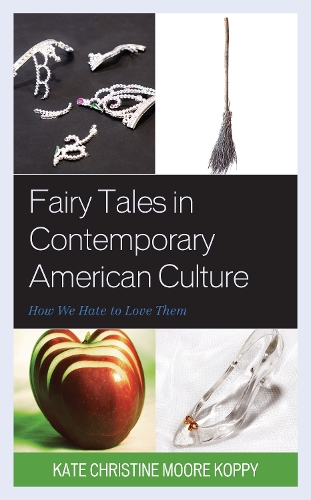
Fairy Tales in Contemporary American Culture: How We Hate to Love Them
(Paperback)
Publishing Details
Fairy Tales in Contemporary American Culture: How We Hate to Love Them
By (Author) Kate Christine Moore Koppy
Bloomsbury Publishing PLC
Lexington Books
18th August 2022
United States
Classifications
Professional and Scholarly
Non Fiction
Folklore studies / Study of myth
Popular culture
306.0973
Physical Properties
Paperback
174
Width 152mm, Height 227mm, Spine 11mm
290g
Description
In the twenty-first century, American culture is experiencing a profound shift toward pluralism and secularization. In Fairy Tales in Contemporary American Culture: How We Hate to Love Them, Kate Koppy argues that the increasing popularity and presence of fairy tales within American culture is both indicative of and contributing to this shift. By analyzing contemporary fairy tale texts as both new versions in a particular tale type and as wholly new fairy-tale pastiches, Koppy shows that fairy tales have become a key part of American secular scripture, a corpus of shared stories that work to maintain a sense of community among diverse audiences in the United States, as much as biblical scripture and associated texts used to.
Reviews
This book offers a unique entry point into fairy tale studies because it offers a distinct framing of contemporary phenomena that brings together fields that generally remain separate: fairy tale scholarship, Disney studies, and mythic cultural cohesion.
-- K. A. Laity, College of Saint RoseIn Fairy Tales in Contemporary American Culture: How We Hate to Love Them, Kate Koppy compels the reader to see fairy tales as American secular scripture, which, like sacred scripture, works to create a community identity among shared readers, listeners, and viewers. Her book provides rich analysis of fairy tales' popularity in American culture and a novel methodology for scholars to explore fairy tale consumption and production. Koppys writing is accessible, her argument is compelling, and her book is a must for scholars and lovers of fairy tales.
-- Amanda M. Caleb, Misericordia UniversityThis brilliant study considers how fairy tales have supplanted biblical scripture to become the new cultural locus of social cohesion in the U.S. Many scholars have dismissed the fairy tales role in cultural development, but Koppys work serves as an important corrective by plotting the role fairy tales have taken on in modern America, how these tales have become ingrained in American mythos, and how their very pervasiveness allows for the interrogation of American core values. For scholars of the development of the American imaginary, students of contemporary folklore, or anyone touched by the cultural force of fairy tales, Koppys book is a vital read.
-- David Sweeten, Eastern New Mexico UniversityThis is an important and incisive book that rethinks how we understand the cultural work of fairy tales in the twenty-first century. Drawing on a wide range of fairy tales in a variety of media from across the globe and throughout time, Kate Koppy prompts us to read these stories as secular scripture, the fundamental narratives that make it possible for communities to cohere in a postmodern world. In doing so, Koppy offers us a new intersectional methodology for reading the evolution and dissemination of fairy tales in the contemporary United States.
-- Nicholas Mohlmann, University of West FloridaAuthor Bio
Kate Koppy is assistant professor in the Department of Humanities at the New Economic School in Moscow, Russia.
